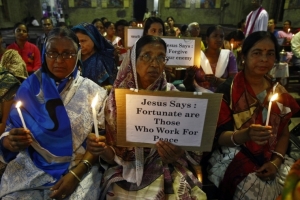How to Lead and Love in the Face of Animosity

Nearly 20 years ago, I was walking down the large hall of a Convention Center during a national church meeting when I heard him. "You!" "You!" I turned to see a man nearly running in my direction pointing a very accusatory finger. You might wonder why I didn't run. I can tell you that I felt no sense of physical fear. I said a breathe prayer as he approached, "God, whatever he has to say, let me really hear him."
I knew I was unpopular amidst the gathered crowd. I was holding to historically Christian positions on issues in direct contradiction to their currently felt needs and desired outcomes. Theological and policy positions were now viewed as personal, making my advocacy a form of personal animus in their minds. Those who knew me, knew this wasn't true. The man approaching me was convinced I was quite literally the enemy.
As he drew near, right hand forming the shape of a gun, his entire body aggressively surging with adrenaline, he repeated again and again, "It's all your fault! It's all your fault!" The rest of his speech was filth laden and is not worthy of repeating.
When I perceived the tirade was complete, I asked in reply, "All of it? It's all my fault? That covers a wide swath. What exactly is all my fault?"
Searching for words as he fumed, he finally said, "Those people didn't need to know what you told them. They only needed to hear my story and the stories of other people. You confused them. It's all your fault. It's all gone to hell and it's all your fault!"
(As a point of reference here let me acknowledge I had just successfully overseen a national referendum resulting in a better than 75% positive vote across 173 voting jurisdictions in the denomination to maintain language requiring ordained leaders to live in "fidelity in marriage between a man and woman or chastity in singleness." The fact of efforts existing to strip that requirement from the denomination's constitution is what was allegedly here "all my fault.")
By now, the cocked and pointed finger was less than an inch from the bridge of my nose. Closing my eyes now, I can still see it. I can also still smell his sweat and I can see his dilated eyes. This was rage. This was not a man in his right mind. Arguing with him would prove utterly fruitless and although I wanted to burst out laughing at the absurdity of his charge that everything, all of it, was my fault, I determined instead to simply stand there, silently – shoulder slack, facial muscles relaxed, looking him in the eye without judgement. That, by the way, was not me, that was the Spirit of God.
He made a few guttural sounds through a clenched jaw. His body was entirely tense and I got the sense that he really wanted to hit me, but he didn't. His arm was now shaking in fury as he continued to point at me. All he could say was "You! You" and then he paused as if he wanted to add words but could find none. I simply stood there. There was nothing to say that seemed worth saying at the time. Eventually he spun in the direction from which he had come, gave what I'll describe as a primal growl, and stormed off.
The most surprising thing to me was that no one, literally no one, in a crowded convention center corridor, stepped in, stopped him, nor approached me after he left. No one.
Leadership is lonely business and Christian leaders must stand and speak truth and engage the mania of our current cultural moment with the confidence that we are not alone even when, to all the world, it sure looks like we're all alone. We have to know, in the depths of our being, we abide in Christ, we are filled with His Spirit, we exist for His use and we are used in any given moment for His glory.
As I turned to continue walking in the direction I had been headed when I heard the angry man yelling in the corridor behind me, I felt a mixture of physical pain for the man's anguish, a reasonable self-doubt about the future of the effort in which I was engaged, and deep grief over the status of things in what was supposed to be an expression of the Church. I was forced to consider my responsibility in the conversation of the day. Not just the content of the arguments being made, but the tone and the tenor and the way in which the Truth was being brought to bear on a process ultimately dominated by personal experience, feelings and narrative.
Those who were making the case that God's design in Creation of male and female human beings created intentionally as such in God's image was no longer valid. We were being told it was wrong to see male/female monogamous lifelong covenant marriage as reflective of the union of Christ and His bride, the Church. That was too narrow, too restrictive, and not loving to those who chose alternative expressions of relationship. Yes, there were those who were following my lead in upholding and advocating for the Truth found in the Scriptures and understood by every generation of Christian believers until very recently, but there was a growing constituency of opposition, building fortresses of assault on the position I was advocating. Literal battle lines had been drawn in what was supposed to be an expression of the body of Christ in the world.
The Gospel, as it had always been understood, was not being proclaimed for the salvation of humankind. This was not a fellowship of the saints and in this body, people were not being sheltered nor nurtured in faith. Divine worship had given way to the idol of sexual expression. The truth was openly and actively suppressed. Social righteousness was narrowed to advocacy for personal identity politics and while there was an exhibition, it was not an exhibition of the Kingdom of God to the world. How much of all that was my fault?
What I experienced in one branch of mainline Protestantism has now become the experience of many American evangelicals. The challenge is how do we speak the truth in a generation of increasingly itchy ears and do so in a way that communicates the deep, deep love of God?
Then, as now, I was not willing that the Truth revealed by God in the Bible and the person of Jesus, be compromised. But light remains as painful to those living in darkness today as it has ever been. So how do we speak truth without hurting people's feelings? That, it seems to me, is the aching leadership question for Christians today.
From my experience over many years, I have learned:
- How we carry ourselves into those conversations matters. Because we carry the name of Christ.
- How we speak – in words, body language, posture and tone – matters. Because we speak the Truth of Christ.
- How we walk in the world, the integrity of our lives with that which we espouse, matters. Because we desire others find the Way of Christ.
- How we live out the faith once delivered to the saints – THE faith, a faith which has content measured against the holiness of a man who was also God, Jesus, the Christ – matters. Because we who live in Him no longer live for ourselves but for Him who died for us and rose for us and reigns in power for us and pleads for us.
If you're a Christian and you are in a position of influence over others, you are a leader. As leaders we bear the responsibility of shepherds in the Spirit and manner of Christ. The people wandering around don't even know they are lost, they don't know who they are nor to whom they are meant to belong. They look for and find identity, belonging and purpose in many lesser things than the glory for which they were created and into which, even now, God desires they be redeemed. And who has He sent to do that work? You and me.
Originally posted at The Reconnect.




























